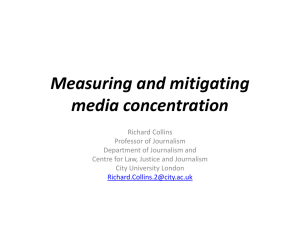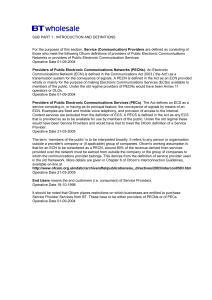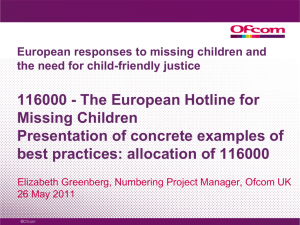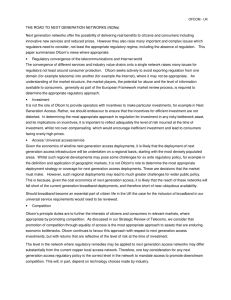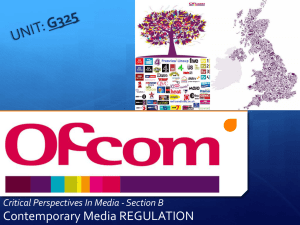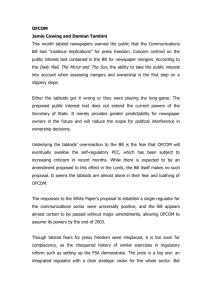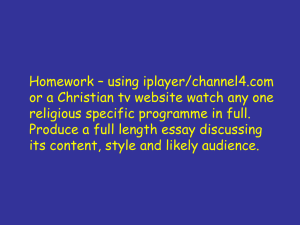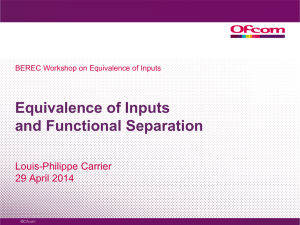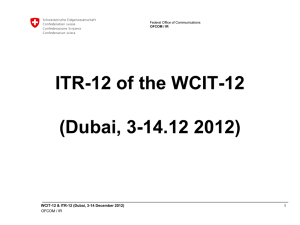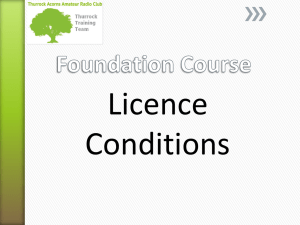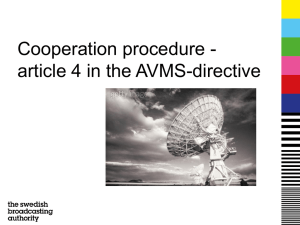File
advertisement
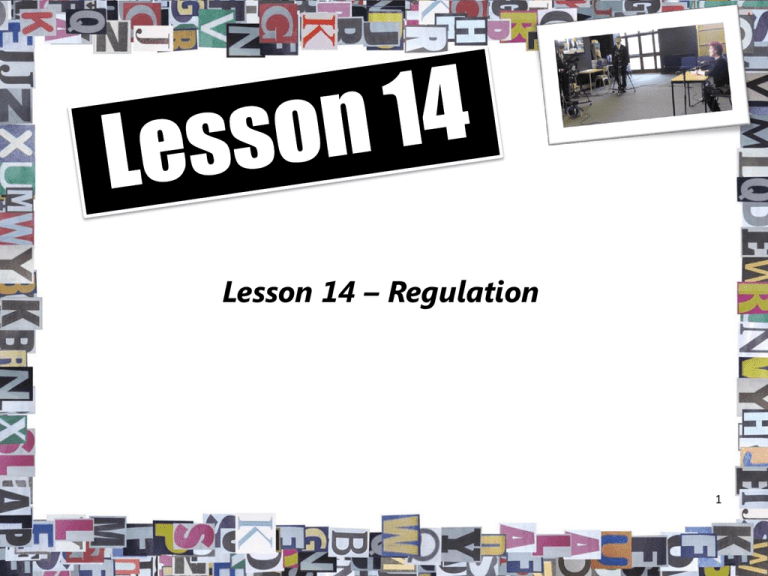
Lesson 14 – Regulation 1 Starter Watch this TV news broadcast: Students are then asked to consider how they know the news is accurate and discuss with the person sitting next to them. 2 Starter Is this news story accurate? How do you know? 3 Starter In actual fact this was a TV news report which was broadcast on the programme Panorama in 1957 – the Spaghetti-tree. This was an April Fool’s prank and it has been classed as the greatest hoax ever pulled off by a reputable news establishment! As spaghetti was little known in the UK at this time, people wanted to know where they could get one from! 4 True or false? Read these news stories: Are these valid and accurate news stories? 5 The Day Today This programme was broadcast back in 1994 (some 20 years ago!). It was broadcast as a mock news programme and involved reporting on lots of silly, fictitious news stories, albeit presented in a very formal television news presenter style. It even follows the same format as ‘normal’ television news programmes. 6 The Day Today What was similar to a ‘normal’ TV news broadcast? 7 The Day Today What was similar to a ‘normal’ TV news broadcast? Music Tone of voice Graphics Titles 8 The Day Today Bombdogs report How can we find out whether this is real? 9 Truth and validity of news Answer these four simple questions! 1. Who is the current head teacher of your school? 2. Which team was top of the Premier League in 2014? 3. Who was King/Queen of the Jungle in I’m a Celebrity… Get Me Out of Here! in 2014? 4. Is EastEnders broadcast at 7:30 or 8:00 on a Monday evening? 10 Truth and validity of news Answers 1. Who is the current head teacher of your school? (Mr Bartlett) 2. Which team was top of the Premier League in 2014? (MANCHESTER CITY) 3. Who was King/Queen of the Jungle in I’m a Celebrity… Get Me Out of Here! in 2014? (Carl Fogarty) 4. Is EastEnders broadcast at 7:30 or 8:00 on a Monday evening? (8:00) 11 Truth and validity of news How did you know the answers to the questions? How could you find out using two reliable sources? 12 Sources When newsgathering, it is important to know that the news you are selecting is accurate and truthful. You must therefore be able to check your facts. You must use reliable sources – at least two different sources. Sources could be in print, broadcasting or Internet platforms – or even face to face – but must be trustworthy! 13 Is this statement correct? ‘News reporting must be fictitious and does not need to be proven.’ 14 ‘News reporting must be fictitious and does not need to be proven.’ This is wrong! News reporting must be valid, truthful and accurate. If it isn’t – who would you complain to? 15 Regulatory body: Ofcom Ofcom was formed as a result of the 2003 Communications Act. Ofcom’s role in television is to regulate what is broadcast. Ofcom does not regulate the BBC. It is self-regulated by the BBC Trust. There is a code, called the Broadcasting Code, and this has an extensive set of rules which must be followed. Viewers may complain directly to Ofcom about all TV broadcasts. If a complaint is made, they ask the broadcaster for a copy of the programme and examine it for any breach of the Broadcasting Code. The broadcaster is allowed to respond to the complaint. Ofcom will decide whether the complaint is ‘upheld’, ‘not upheld’ or ‘resolved’. COPY THIS INTO YOUR BOOKS 16 Section Five of Broadcasting Code Section Five: Due Impartiality and Due Accuracy and Undue Prominence of Views and Opinions You will be given a segment of Section Five to go through in groups. Your job is to put your segment into ‘student speak’ so that we can all understand the section. Our goal is to make a clearly presented set of rules. 17 Discussion A very important announcement is expected to be made from Buckingham Palace. There is speculation as to what it could be. A TV journalist is outside the Palace along with other journalists, when she is handed a piece of paper with the following information on it: ‘The Queen is going to abdicate in favour of Prince Charles.’ She knows that only she is possession of this information and that if she were to report on it, she would have an exclusive piece. However, she has no time to verify this piece of information before her news report is televised live. Should she go ahead with reporting this news? • • Using what you have learnt today, discuss with another student. What would you do and why? 18 Regulatory body: Ofcom Complaints According to a report produced by Ofcom and reported by the Telegraph, ITV and BBC News are in the top 10 of complaints made by the audience. A prominent news report complained about was the reporting of the death of Lee Rigby, a British soldier. All TV news channels were under investigation for showing graphic images pre-watershed. Read why viewers complained to Ofcom: 19 Regulatory body: Ofcom Lee Rigby Watch the Channel 4 News report. (WARNING: Contains graphic imagery!) 20 Regulatory body: Ofcom Do you agree with the complaints? Discuss the complaints with the person next to you. Do you think it was necessary to show such graphic imagery pre-watershed? 21 Regulatory body: Ofcom NOT IN BREACH Read the result of the Ofcom investigation. 22 Have Your Say! Visit this website which allows the general public to respond to the BBC News team on various issues and debates. http://www.bbc.co.uk/news/have_your_say/ Navigate to the section called ‘Are you affected?’. Choose a topic and complete the worksheet you are given. Write down the question and provide an answer. 23 Plenary What does Ofcom stand for? 24

